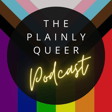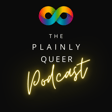
Growing Up Queer
In this episode of The Plainly Queer Podcast, we journey back in time to explore what it was like growing up queer in Ireland during the transformative decades of the 90s and 2000s.
Our hosts delve into the heart of their personal experiences, sharing stories that capture the essence of a unique time in queer history. They reminisce about the powerful queer pop culture moments that shaped their identities, and discuss the compelling question: Is coming out really about letting others in?
The discussion then shifts to the progression of societal attitudes, as we reflect on the changes in the past few decades. Has acceptance grown? Is it easier now for young people to express their identities openly?
We also tackle a listener's question about the intricacies of pronouns – a fundamental part of recognising and respecting identity.
Join us for this fun, informative episode that not only presents a time capsule of queer culture in Ireland but also offers insights into the ongoing evolution of queer identity and acceptance. Whether you're part of the LGBTQ+ community or an ally, this episode is a delightful blend of humour, heartfelt stories, and educative discussions. Enjoy!
Online or In-person Therapies: Insight Matters - a fantastic resource providing Queer affirming online and in-person therapeutic support. Visit www.insightmatters.ie for more information.
LGBTQ+ community support in Ireland: https://lgbt.ie/
LGBTQ+ Youth Support in Ireland: https://www.belongto.org/
Transgender Equality Network Ireland: https://teni.ie/
Phone Help Lines:
- Samaritans: 24-hour service – freephone 116 123, www.dublinsamaritans.ie
- Childline: 24-hour service – 1800 66 66 66, www.childline.ie
- Teenline: 8 pm-midnight – 1800 833 634, www.teenline.ie
- Aware (Depression): 1890 303 302, www.aware.ie
- Pieta House (Self-Harm/Suicide Support): 01-6010000, www.pieta.ie
- Bodywhys (Eating Disorders): 1890 200 444, www.bodywhys.ie
- Console (Suicide Bereavement Support): 1800 247 247, www.console.ie
- Grow (Mental Health Support Groups): 1890 474 474, www.grow.ie
- Alcoholics Anonymous: www.alcoholicsanonymous.ie
- Drugs/HIV Helpline: 1800 459 459 www.hse.ie/drugshivhelpline
- Rape Crisis Network Ireland: 24-hour helpline 1800 77 88 88 www.rapecrisishelp.ie
Crisis Text Line: Text HELLO to 50808 to connect with a crisis counsellor who can provide support and help connect you to further resources.
Remember, you're not alone, and there are resources and people who want to help. So please reach out if you're in need.


